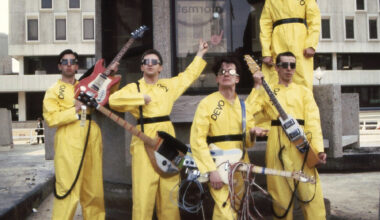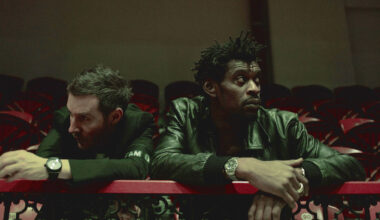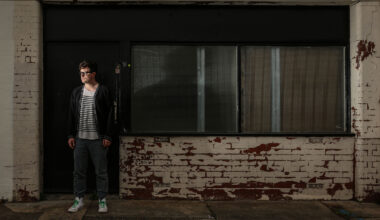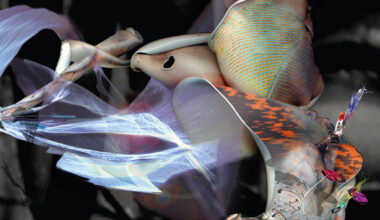Creating a live soundtrack to a silent Buster Keaton classic has been quite the learning curve for Derbyshire’s Haiku Salut, who are also adapting to life as a duo, for a little while at least…
“Eighty minutes of music in two months, it was stressful,” says Haiku Salut’s Sophie Barkerwood. I’m sat with Sophie and Gemma Barkerwood in their rustic studio space nestled in the Derbyshire Dales to discuss the release of their new score to Buster Keaton’s 1926 silent comedy classic ‘The General’. Propped among a cornucopia of electronics, traditional instruments and sprawling wires, our conversation falls at a time of flux for the band, not least because of shifting family responsibilities with the third member of the trio, Louise Croft, currently enjoying maternity leave.
In October 2018, fresh from touring last year’s ‘There Is No Elsewhere’ album, the band were commissioned by Nottingham Contemporary to pen 80 minutes of new music to accompany the Keaton film for BFI’s Comedy Genius season, the debut performance of which was due just three months later in January 2019. Such was the success of the Nottingham performance that Haiku Salut have subsequently visited numerous cities across the UK with the show and, with a unanimously positive response, the score sees its release as a stand-alone double album this month.
It was always a project that was going to work. Since their folktronica debut ‘Tricolore’ in 2013, Haiku Salut’s music has revelled in its cinematic qualities, soundtracking imagined scenes. But being presented with a venture such as live scoring an established classic must have given them something familiar to work with, instead of starting from scratch?
“I’d never seen a Buster Keaton film before, which I’m quite ashamed of now,” says Gemma. “I’ve never really given silent films a chance.”
But the stunning 4K restoration by Cohen Media Group of the silent film changed that, opening up a rich seam of deep, complex inspiration to work from. Set in the American Civil War, ‘The General’ is an action adventure comedy that maps protagonist Johnnie’s quest to rescue his two loves: Annabelle, and his beloved steam engine, from which the movie takes its name.
“But we didn’t really want to write a comedy score,” says Sophie.
“Don’t get me wrong,” interjects Gemma, “the first time we watched it we did just put a slide whistle everywhere.”
“And we were joking about who would be doing the trombone,” adds Sophie. “It is a sad story really, and we wanted to highlight that. Everything keeps going wrong for Johnnie. The two big loves of his life have been stolen, and he sets out to get them back. ”
The movie plays differently in 2019 than it would have in the 1920s. The Barkerwoods ponder the societal baggage that the past brings, not least Keaton’s character fighting for the slave-owning Confederacy and, in one scene, an overt display of domestic violence.
“When we initially watched it we were like, ‘Oh no, we’re going to have to use the music to undermine certain themes’,” says Sophie. “But after we watched it a few more times, we found he undermines the fact he is fighting for the South. When he goes to put the flag up and he falls over, to me, it shows that he knows he is fighting for the wrong side.”
While the sonic make-up of the Haiku Salut sound has gently morphed into a more electronic based affair since 2015’s ‘Etch And Etch Deep’, where blips and glitches bubbled through the compositions, the past year has pushed their work into a new context. The band have been exploring the processes and motivations behind their musical creativity, collaborating with Public Service Broadcasting on ‘They Gave Me A Lamp’, performing new compositions live with the Manchester Robot Orchestra and providing music for the Nintendo Switch game ‘Chime Sharp’, all of which led to this latest commission. In many ways, Sophie says, the process of tapping into other forms of art is “liberating”, especially when you are creating something from nothing.
“When we were writing the other albums,” she says, “you can become paralysed with possibilities because you don’t have something to springboard off. But the fact that we had that film and the inspiration that came from it, it was a massively different process. When we watched the film, we separated it down into what we thought were manageable sections of different emotions. We split it up and managed each different part, and then we’d bring all the different parts back together and then work together on those. There was a stricter organisational regime.”
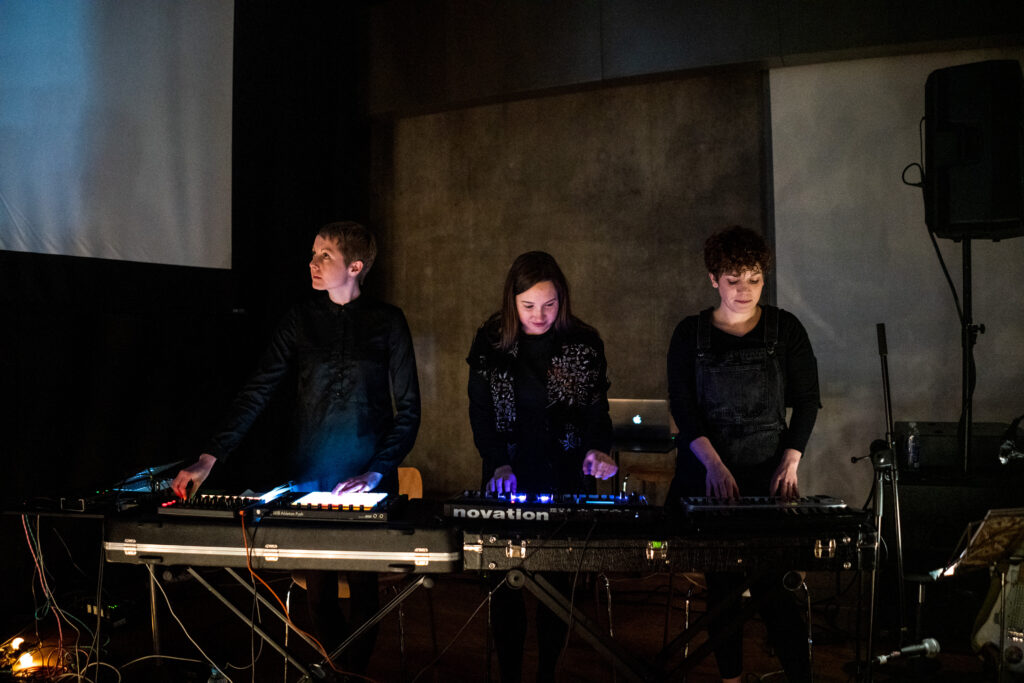
Under the time constraints, the band’s usual painstaking, patchwork method was side-lined for something more methodical, alongside another big change.
“Where ordinarily we would go to Snug in Derby and they would produce it all, we recorded and produced it all here,” says Sophie, gesturing to their rehearsal/studio space. “We had to do it that way to get it done in time. Now we are able to record and produce stuff here, and it be of a decent quality, this has given us the confidence to do that.”
Sophie speaks with her leg propped on an accordion, there’s a tambourine by Gemma’s feet and the place is literally packed with the tools of their sonic trade. Anyone who has witnessed Haiku Salut live will be familiar with the complex instrument-swapping dance they perform, mixing laptops with “real” instruments. The live show for ‘The General’ required a simpler, if no less ambitious approach.
“We did think, ‘Right, we need to do stuff that is only synths and guitar’ when we were writing,” says Sophie. “We could have gone all out with ukulele, drums, trombone and trumpet, but we decided not to do that.”
The focus on synths and guitar textures is an evolutionary step from the new directions heard on ‘There Is No Elsewhere’, which further embraced aspects of techno and post-rock. ‘The General’ retains the charm and humanity of previous releases on tracks like ‘Loves’, with its melancholic piano and surreal shimmers, but the drone of ‘Engine’ and kinetic synthwave of ‘Train Steal’ mark new territory.
Having to translate it directly into a cinematic performance space was a major factor in this new stripped-back approach.
“I think using all the instruments makes it distracting for people watching the film, and we didn’t really want that,” says Gemma. “We didn’t want to pull people away from the film, and cracking a trombone out would do that!”
While a standard Haiku Salut performance is a visual affair, a carefully choreographed dance, for the Keaton shows, the band were not the focus of attention at all. To much of the audience, they were a secondary element to the show.
“Not only are the audience concentrating on the film, but we are also concentrating on the film and making sure our response to it is timely and correct,” adds Sophie.
Removing themselves from the equation as visual performers and having to reconsider the way the music was delivered felt prescient at the time. Away from the dark cinema screens of the Keaton shows, the pair had to discover how to deliver the goods during Louise’s temporary absence. Live performances as a duo at the 10th anniversary shows for the Hello Thor label in Nottingham and at Cardiff Psych And Noise Fest in May saw them embrace electronics like never before, presenting a harder techno edge. Originally reluctant to embrace how technology could change their live set up, Gemma explains that the shows and the positive response to them came as a pleasant surprise.
“I’ve really enjoyed performing as a duo,” says Sophie. “It could have been really weird without Louise. It was strange to be working like that, but once you’ve done the first show you realise it’s worked, but in a different way.”
“It was hard,” notes Gemma of working with a missing bandmate. “I feel like we’ve done a good job, but I’m looking forward to Louise coming back.”
Despite the apparent reduction in instrumental scope, Haiku Salut’s ambitions to deliver a visual live show haven’t diminished.
“We’ve always been conscious of not using MIDI instruments, playing more ‘real’ instruments, but I think it can all work together,” says Gemma. “I was always worried it would be tedious to watch. But we have the MalletKAT, which you hit, so you get the expression from that. I think it looks better than I thought it would.”
Inspired by a recent orchestral performance of William Basinski’s ‘The Disintegration Loops’ in Manchester, tape loops have also found their way into the latest Haiku set-up.
“We’ve got a Tascam four-track and we’ve been splicing cassette tape on a nine-second loop to create a wonky, drone type sound,” says Sophie. “It was nice to use old technology as well, because it’s fun and manual.”
Using tape also brings something back into the mix that their move to new tech could have lost. Haiku Salut’s live performances have always teetered on the edge; so much precision is needed, that things can go wrong, equipment can break, timings can be missed. Adding a certain humanity to their shows is exactly what has seen them win over fans of rock music as much as those of the electronic arts.
How this all evolves is, like the band, in a state of flux and will remain a constantly shifting equation for some time. Indeed, by the time this discussion goes to press, Louise will have rejoined the Haiku Salut ranks to again guest with Public Service Broadcasting as the band finish touring their ‘Every Valley’ album at Caerphilly Castle in Wales, a small step to solidifying the new-look trio.
“It’s evolution really,” says Sophie. “Over the years we have just added and added things, and it turned into a bit of a monster. It’s fine, but it just became a bit too much, so when Louise comes back full-time we will be looking at that. The Buster Keaton process has been really useful, knowing we could make this big sound with the equipment we had will really help for our new trio show.”
It’s clear that the band that entered the Buster Keaton process is not the band that will emerge after it. As they continue to explore artistic collaborations, new musical theories and technologies, Haiku Salut could well morph into something else entirely.
‘The General’ is out on Secret Name

